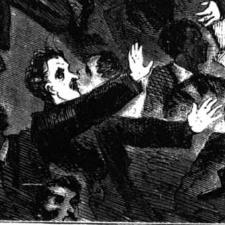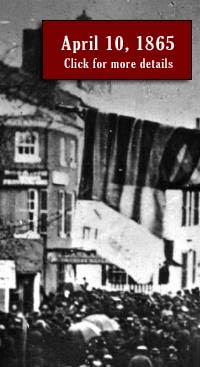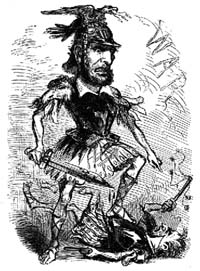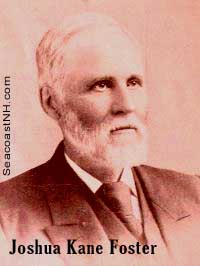|
FRESH STUFF DAILY |
|
|
||
|
|
||
|
|
||
|
SEE ALL SIGNED BOOKS by J. Dennis Robinson click here |
||
Page 1 of 2 All hell broke loose in Portsmouth, NH on April 10, 1865. A mob of upstanding citizens fresh from 50 local bars were celebrating the end of the Civil War. Someone suggested that it was time to teach old Joshua Foster a lesson. Foster was a "Peace Democrat" and editor of the local STATES AND UNION newspaper. Here, in detail, is what happened that day.
READ: Lucy & John Wilkes Booth On a rainy April 10, 1865, a Portsmouth mob trashed the office of a Democratic anti-war newspaper opposed to a Republican president. During a two-hour melee, a drunken crowd of up to 2,000 citizens, sailors and shipyard workers threatened to lynch the editor of the States and Union. The editor narrowly escaped out the back door clutching his ledgers and subscription list. Local police took no action as the "mobocracy" smashed the printing press and tossed office equipment and files out a second story window onto Daniel Street. One of Portsmouth’s earliest news photographs captured the event. The crowd cheered and later dispersed to attend a patriotic rally in Market Square. Wait a minute. Let's take a closer look at those facts. The history of the American Civil War is rarely as simple as black and white or north vs. south. The Copperhead Voice To most locals, Foster was simply a "Copperhead". The pejorative term now refers to any Southern sympathizer living in the north during the Civil War. There were certainly many New Englanders who opposed the war. Some were willing to see it end at any cost, even if that meant the secession of the Confederacy and the creation of a pro-slavery nation. Many local textile merchants had close ties to cotton production in the South. They were afraid that the Abolitionist movement would wreck the national economy by releasing the enslaved workers who kept cotton prices low. Others were simply attracted to Foster's racist commentary in an era when racial prejudice against blacks was common, even in New England. The States and Union appeared the day after Lincoln issued the Emancipation Proclamation. Foster's unrelenting attacks on blacks, the church, the military, the president and the war made him a lightning rod for violence during a very stormy time. Foster described himself as a "states rights" Democrat who advocated the right of each state to embrace or reject slavery. Stephen Douglas of Vermont, Lincoln's presidential opponent, offered a similar view. So had former President Franklin Pierce who was a New Hampshire native. As the horrifying Civil War dragged on, the "Peace Democrats" drew attention to the enormous cost of the conflict in human lives and national resources. The Portsmouth Naval Shipyard, busy turning out warships, was among Foster's frequent editorial targets. He referred to Americans who favored the war as "loyalists", evoking a Revolutionary War term that, in New England, had implied blind obedience to the British king. Protesting the Draft
When Lincoln was forced to adopt a military draft to shore up the failing Union forces in 1863, Foster howled in protest. He and others were especially angry that wealthy young men could buy their way out of army service for a payment of $300. This was a war, Democrats claimed, fought for the rich by the poor. Like New York and Boston, Portsmouth had its own "draft riot". The protest became a gunfight and a number of men were wounded in the anti-draft uprising. All four men arrested were from Portsmouth's South End, or what politicians called "the Copperhead Ward". Foster, true to form, sided with the anti-draft protestors who were never brought to trial. The only crime they ha committed, Foster wrote, was the crime of being Democrats. Bigotry Vs. Truth
It is easy, because of Foster's views, to shrug him off altogether. The late Portsmouth historian Raymond Brighton took special delight in continually noting that Foster went on to found Foster's Daily Democrat in 1873. One of the last independent daily newspapers in New England, The Democrat is still run today by the Foster family. When Brighton wrote his history of Portsmouth, he was also the editor of the competing daily paper, The Portsmouth Herald. So his jibes at editor Bob Foster, a direct descendant of Joshua, must be taken with more than a grain of salt. Yet the States and Union has value today. Foster's lone wolf journalism did represent a howling Yankee minority. When Dover Senator JP Hale uncovered evidence that the Navy Yard was purchasing equipment at outrageously inflated prices, Foster gave the scandal extensive, if not gleeful coverage. When Abolitionists claimed that New Englanders had always been free of slavery, Foster took issue with their reading of history. Our founders, even the holy Puritan fathers, he wrote, often had Indian and African slaves and white indentured servants. As an independent reporter and publisher, Foster was able to expose hypocrisy where others feared to tread. But when reporting on issues that fired his Copperhead views, he was easily blinded by emotion. Discovering once that a biography on Lincoln had been reduced in price at the local bookstore, for example, he reported that the president’s popularity was plummeting. When a stray bullet fired by a conscripted black soldier during target practice at the Navy Yard accidentally killed a 12-year old Portsmouth boy, Foster promoted the accident as a racial incident. His racist ranting, over the top even for 19th century journalism, reveals just how hateful the "states rights" movement had become in its last desperate years. Lincoln's victory in the Civil War followed in the same week by his martyrdom set in motion the long slow undoing of American slavery. CONTINUE the RIOT OF 1865/ much more
Please visit these SeacoastNH.com ad partners.
News about Portsmouth from Fosters.com |
| Tuesday, April 16, 2024 |


|
Copyright ® 1996-2020 SeacoastNH.com. All rights reserved. Privacy Statement
Site maintained by ad-cetera graphics

 HISTORY
HISTORY



 LINCOLN'S NH CONNECTION
LINCOLN'S NH CONNECTION
 By his own account Foster said he had few true friends in Portsmouth, but his four-page paper did contain local advertising and clearly attracted readers. The States and Union appeared in Portsmouth as the Copperhead movement was on the rise in America. Those who wanted the war to end for a variety of reasons hoped to prevent Lincoln from being re-elected. In Foster's view, The Portsmouth Chronicle, the NH Gazette, the Portsmouth Journal and the Ballot were all singing from the pro-war abolitionist songbook. To his detractors, Foster's alternative view was nothing short of treason.
By his own account Foster said he had few true friends in Portsmouth, but his four-page paper did contain local advertising and clearly attracted readers. The States and Union appeared in Portsmouth as the Copperhead movement was on the rise in America. Those who wanted the war to end for a variety of reasons hoped to prevent Lincoln from being re-elected. In Foster's view, The Portsmouth Chronicle, the NH Gazette, the Portsmouth Journal and the Ballot were all singing from the pro-war abolitionist songbook. To his detractors, Foster's alternative view was nothing short of treason. It is still unclear what facts lay at the heart of Foster's strongly held political and racist views. He was born in Canterbury, NH in 1824 and grew up in Chichester. He became a successful architect, designing a number of local buildings. He was also a farmer, carpenter and builder. He bought an interest in his first newspaper, the Dover Gazette, in 1858 and moved to Portsmouth a few years later to start the States and Union.
It is still unclear what facts lay at the heart of Foster's strongly held political and racist views. He was born in Canterbury, NH in 1824 and grew up in Chichester. He became a successful architect, designing a number of local buildings. He was also a farmer, carpenter and builder. He bought an interest in his first newspaper, the Dover Gazette, in 1858 and moved to Portsmouth a few years later to start the States and Union.














